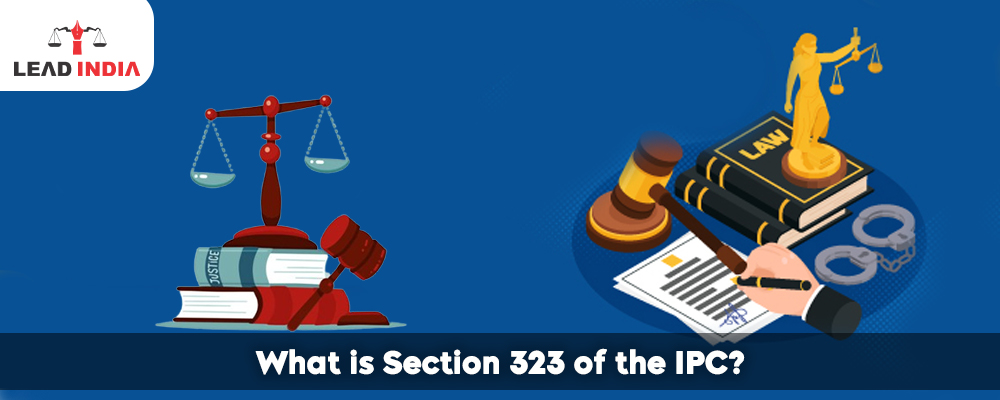The Indian Penal Code (IPC) (now Bhartiya Nyaya Sanhita) is the main source of criminal law in India. Of all its provisions, Section 323 of the IPC (now Section 115 (2) of Bhartiya Nyaya Sanhita) refers to punishment for voluntarily causing hurt. The section plays an important role in the sentence of reputation by victims against the wrongdoers.
Section 323 of IPC: About
- Anyone who intentionally causes harm, with the exception of Section 334 (now Section 115(2) of the Bhartiya Nyaya Sanhita), faces a term of imprisonment of any kind that can result in up to twelve months in prison, a fine of up to ten thousand rupees, or both.
- The section states that any act of voluntarily causing hurt shall not apply to cases under Section 334 (Section 115 (2) of Bhartiya Nyaya Sanhita). It addresses causing harm in response to severe and unexpected provocation.
What is Hurt?
Section 323 (Section 115 (2) of Bhartiya Nyaya Sanhita) must be understood by referring to the definition of “hurt” under Section 319 IPC (Section 114 of Bhartiya Nyaya Sanhita):
“Causing bodily pain, disease, or infirmity to anyone is hurt.”
It includes:
- Bodily pain: Pain is always intentional and physical.
- Disease: It means induced transmission of any disease.
- Infirmity: Temporary or permanent degradation in body functionality and incapacity in any form.
So, all injuries related to physical harm or discomfort fall within the definition of “hurt.”
Need A Legal Advice
The internet is not a lawyer and neither are you. Talk to a real lawyer about your legal issue

Elements of the Offense: Section 323 of IPC
- Volition: The act that results in or causes hurt must be intentional or willful.
- Causing Hurt: The act must cause physical discomfort, illness, or disability.
- No justification: The act must not fall into such exceptions as self-defence or other permissible acts, done without any sinister intention.
Punishment Under Section 323 IPC
The penalties as per Section 323 (Section 115 (2) of Bhartiya Nyaya Sanhita) are:
- Imprisonment for one year
- Fine which may extend to ₹10,000.
- Both imprisonment and fine may be impose.
This provision declares Section 323 (Section 115 (2) of Bhartiya Nyaya Sanhita) to be a bailable, non-cognizable, and compoundable offence:
- Bailable: Bail can be obtain by the accuse as a matter of right.
- Non-Cognizable: The police have power neither to arrest the accused nor to investigate without the prior approval of a magistrate.
- Compoundable: The permission from the court is require to compound by the victim as well as the accuse.
Legal Procedure
- Complaint to be Filed: Section 323 (Section 115 (2) of Bhartiya Nyaya Sanhita) is indeed a non-cognizable offense and the victim must complain to a magistrate to commence the legal proceedings.
- Investigation and Arrest: The Police need prior approval from the magistrate for investigation or arrest of the accused.
- Trial: The trial takes place in a magistrate’s court. The burden of proof for the prosecution lies on the accused, who has to prove that he has done so or not.
- Compounding of offense: The complainant and the accused may agree to compound the offense, subject to the approval of the court.
Criticisms and Challenges
Difficulties that remain even with IPC Section 323 (Section 115 (2) of Bhartiya Nyaya Sanhita) being an important remedy regarding bodily injury:
- Minimal Punishment: It is frequently attack for inadequate punishment where hurt is intentionally and maliciously inflict under section 323 (Section 115 (2) of Bhartiya Nyaya Sanhita).
- Scope for Exploitation: The provision being compoundable sometimes gets misuse for extortion or harassment.
- Delays in Proceedings: Non-cognizability of the offense would, thus, result in a long delay for obtaining justice.
Societal Impact
- IPC Section 323 (Section 115 (2) of Bhartiya Nyaya Sanhita) imparts punishment on minor assaults, which mostly remained unreported due to society or reluctance to involve law adequately.
- Thus, it provides redressal mechanisms to facilitate access to justice for persons even in cases of insignificant injury.
Recommendations for Reform
In order to strengthen Section 323 (Section 115 (2) of Bhartiya Nyaya Sanhita), the following remedies have been propose:
- Stricter Punishments: Updates in the existing fine and imprisonment to contemporary standards.
- Simplifying Procedures: Allowing the police to conduct investigations without obtaining prior permission from the magistrate.
- Awareness Campaigns: Educating the Public on their rights under the section.
As this section prescribes punishment for voluntary acts causing hurts, Section 323 (Section 115 (2) of Bhartiya Nyaya Sanhita) plays an important role. It has a sufficient measure regarding such punishments in the case of petty offenses. Nevertheless, the section has some scope for refinement to meet modern challenges that arise with the progress of Indian society; therefore, legal provisions like Section 323 (Section 115 (2) of Bhartiya Nyaya Sanhita) will need to be make relevant to the changes of society while ensuring justice and fairness for all concerned parties.
Section 323 (Section 115 (2) of Bhartiya Nyaya Sanhita) can also be understood and also properly utilize by victims and law enforcement for a legal system maintaining the rights and dignity of each person.
One can talk to a lawyer from Lead India for any kind of legal support. In India, free legal advice online can be obtain at Lead India. Along with receiving free legal advice online, one can also ask questions to the experts online free through Lead India.





 Talk to a Lawyer
Talk to a Lawyer